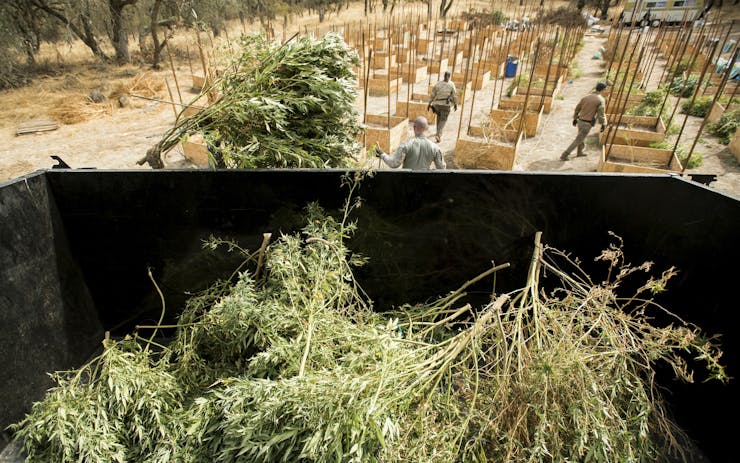A rural California county that placed a major wager on a cannabis green rush—only to later impose a ban after taking in millions in taxes from cannabis farmers—now faces a massive collection demand from growers wanting their money back.
Two of California’s most powerful cannabis attorneys have a filed class action lawsuit on behalf of former cultivators in Calaveras County who are demanding the return of at least $16.3 million in taxes and fees. Many farmers were forced out of business by the county ban.
The lawsuit is the latest chapter in a long, chaotic saga that may well be dubbed the Great Calaveras Cannabis Debacle.
Seventy miles southeast of Sacramento, Calaveras County is a depressed former Gold Rush hamlet of 45,000 people, where local industries including mining, a cement plant, and sawmills long ago shuttered.
In 2015, the county was devastated by wildfire that destroyed 860 homes. Unauthorized cannabis farms soon bloomed beneath charred oaks and pines as marijuana speculators snatched up devalued properties. A receptive Board of Supervisors passed a pro-cultivation ordinance that sought to generate money for the county’s economic recovery while regulating the local industry and capping the influx of unauthorized growers.
Cannabis Is Banned in Most of CaliforniaBy a June 2016 registration deadline, Calaveras had collected $3.7 million in $5,000-per-farm registration fees from more than 700 cannabis cultivators. Five months later, voters heartily approved an initiative, Measure C, to impose cultivation taxes of $2 per square foot on outdoor farms and $5 per square foot on indoor gardens. The county would eventually collect $12.3 million in cultivation taxes, using the money to fund county programs, including new hires of sheriff’s deputies and code enforcement officers for cannabis regulation.
“It is time for light to be shone on the bait and switch of the Calaveras County Commercial Cannabis program.”
But in the same 2016 election, residents also rejected another initiative, Measure D, which would have sweetened local cultivation rules. They also voted in new supervisors, who were decidedly hostile to cannabis.
In January, as the county was still collecting on cultivation tax bills and farm registration fees, supervisors voted 3–2 to impose a total ban on marijuana production, effective spring 2018. In early June, infuriated cannabis growers invited out media members as they destroyed valuable plants before they were ready for harvest.
The lawsuit, filed by the firms of Henry G. Wykowski and Associates, of San Francisco, and William G. Panzer, of Oakland, doesn’t directly take on Calaveras County over its cultivation ban. Instead the class action charges that the county violated the California Business and Professional Code by wrongly collecting taxes and fees on growers before California cannabis regulations and licensing requirements went into effect Jan. 1, 2018.
Wykowski and Panzer are huge names in California cannabis law and politics. Wykowski represented Oakland’s Harborside dispensary in a successful legal challenge to a federal property seizure and is a leading tax attorney in challenging Internal Revenue Service actions against marijuana businesses. Panzer, a prominent criminal defense lawyer in cannabis cases, helped author California’s 1996 Proposition 215 medical marijuana initiative, the first successful statewide cannabis measure in the nation.
In a statement accompanying the lawsuit, filed in Calaveras County Superior Court on August 3, lead plaintiff Andrew Greer said: “Calaveras County required the registered farms to follow a specific and strict set of rules to operate. … This is a case of taxation without representation. It is time for light to be shone on the bait and switch of the Calaveras County Commercial Cannabis program.”
Greer, CEO of a company called Golden State Herb, is one of two individual plaintiffs in the suit, along with fellow former Calaveras cultivator Adam Ray. The suit seeks financial damages on behalf of all growers who paid taxes and fees to the county.
“Despite having dutifully paid the taxes and registration fees (to the county) in anticipation of State of California cannabis licenses in 2018, and in anticipation of the ability to legally cultivate thereafter, no growers are now able to cultivate cannabis within the county,” the lawsuit says.
Shop highly rated dispensaries near you
Showing you dispensaries nearThe Calaveras County Counsel’s office, which declined comment on the action, told Leafly Thursday that county officials still hadn’t formally been served with the suit.
The county announced in June that it was facing a $9.2 million budget deficit, a shortfall worsened by loss of future cannabis revenues. The county is considering raising local hotel taxes to offset the impact.
The vitriol over the cannabis issue in the county was personified by Supervisor Dennis Mills, a fiery opponent of regulation who led last year’s 3–2 vote for the ban. Elected in 2016, Mills claimed that his constituents, who rejected California’s Proposition 64 adult use legalization measure, saw the influx of marijuana farms as a threat to the county’s rural character and security.
“This county has repeatedly spoken out against this,” Mills told Leafly around the time of the ban. He added: “I won my seat in a landslide, sir. Marijuana was one of the issues. People asked me how I felt about it. And I told them outright.”
Mills was joined in the ban vote by Supervisors Gary Tofanelli and Clyde Clapp. Cannabis advocates later tried and failed to recall Mills and Tofanelli. Clapp faces an election challenge in November after finishing a close second in the June primary to Ben Stopper, who argued the ban could force deep cuts in the county workforce and services.
Correction: An earlier version of this story misstated when Calaveras County supervisors voted to ban cannabis cultivation. A preliminary vote occurred last October, and the final vote was in January.






